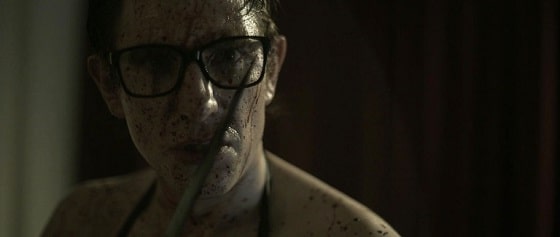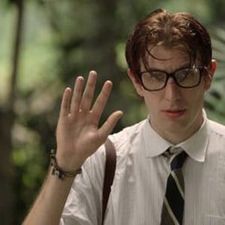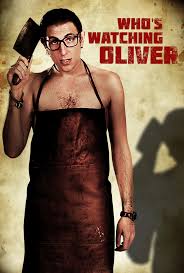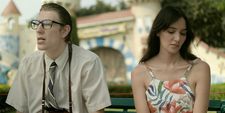 |
| Who's Watching Oliver? |
It’s a film that has been highly praised but is also highly controversial – and definitely not for the faint-hearted. Who’s Watching Oliver has recently been released on Amazon Prime and Hulu. It’s the story of a serial killer whose life is dominated by his abusive mother, even though he has moved away and she can now only communicate with him through his computer. When a young woman (played by Sara Malakul Lane) comes into his life, he may have a chance at escape – but can he take it, and does he really deserve it?
The titular Oliver is played by Russell Geoffrey Banks, who also co-wrote the film. I asked him about the development process and if it began with the character concept.
 |
| Russell Geoffrey Banks as Oliver |
“Originally I wanted to do a serial killer film,” he says. ”I knew Richie [Moore], the director, because years ago we worked on the same set and he was a cameraman and used to teach me about cameras and so on. So then I went to him and said ‘Look, I want to do a serial killer film,’ I was thinking of something like Henry: Portrait Of A Serial Killer style. And then we knew we couldn’t get the funds so we brought in Raimund [Huber] who I worked with previous to that. then the three of us were going over this idea about someone who was a serial killer but who looked like George McFly.
“That was the start of it and then from there it gradually changed and went a bit further and a bit further and a bit further, and the Mama character came into it. And then, it’s not spoken about in the film, but we wrote with it in mind that he is slightly autistic. Also, me and Richie, we read so may books and sat and watched so many documentaries about the effects of abuse over time.
“I think because it was three of us writing it together, that’s why there’s such a mash-up of all these different things. And then a lot of the Oliver stuff came naturally together on set when we were shooting. Certain things just happened, certain scenes were unscripted. It was quite a hard film to film, to be honest. I’ve worked on other films but this was the first one where I feel that I needed to step into the shoes of somebody and really try and transform myself, because I feel that in the past trying to be an actor had got in the way of just being a character.”
Oliver can’t have been an easy character to do that with, I suggest, and he agrees. “It was hard. it was a real dark set – it really wasn’t a nice, pleasant experience.”
Was the film shaped in part by the team’s awareness of the limitations created by their limited resources?
“We didn’t have a lot of resources for the film. It was literally just me, Raimund, Richie,” says Russell. “Richie did all the lighting. We had a sound man, Alex Boyeson, but we didn’t have many people. I’ll give you an example of how little budget we actually had: after one scene finished shooting, me, Richie and Raimund were scrubbing the blood off the floor. It was a weird experience.”
 |
| Who's Watching Oliver? poster |
It’s a very gory film and contains some deeply disturbing scenes. How did they approach those?
“The three of us argued so much about certain things, especially the rape scene. It was a tough one, that – even after we shot, it was a tough one whether to keep some of that in or not... In the scene where Mama makes him masturbate, the whole point of that scene is to show that this is somebody who would have had this his whole entire life. He’s saying yes because he’s so scared of what’s going to happen, but he’s an adult now. So he’s going on what would have happened when he was ten or 12 and she made him do that, and he’s so scared that he does that. This guy has had so much terrible shit go onto him, being mentally physically and sexually abused his entire life, but if you take that scene out then you take away a lot of the history and the context of the rape.
“The first rape scene, it was horrible, so horrible to shoot that. It was the worst scene of my life. And even after the shoot it was a tough one to keep in because you know that’s the thing that makes people hate our film... It’s funny because Mama’s saying some disgusting shit, some really horrible stuff, but after that rape scene you don’t see that much in the film. We didn’t have the resources. Because you’ve seen that first scene – and it’s an old technique in film, they’ve used it a million times – show something horrific at the beginning and then you can get away with talking or making sounds throughout the film to imply that.”
It’s also important to get a balance, I suggest. If the rape scene were not so horrific, there would be a greater risk of some viewers finding it titillating.
“Definitely. And also, we’re aware that while there’s an audience out there that loves us there’s also an audience out there that hates us, which is hard to take because in your head you’re trying to create art and trying to show what this isn’t, but I can see why it would come across that way as well.”
For all that the film balances its sympathies, Russell is careful not to excuse Oliver. “Oliver’s a victim, Oliver’s playing the victim...” he says, without wanting to give too much away. He stresses that Oliver still bears moral responsibility for his actions, regardless of what has happened to him. It’s something that he is is perhaps more uncomfortable with because, he says, as he has got older he’s started to want something different from films. “Through my twenties I watched every edgy film and I loved the bad endings and now I just can’t deal with it, you know? I want a happy ending or else I feel cheated.”
Despite all the darkness, it’s clear that he enjoyed crafting the film.
 |
| Russell Geoffrey Banks and Sara Malakul Lane in Who's Watching Oliver? |
“There’s so many things that nobody will ever pick up on because they were just little hidden messages throughout the whole film. I wrote a lot of the dream stuff and the psychology of the dream meaning was all little clues.”
It also helped to boost his spirits when he was able to take a break from the dark scenes as Oliver experienced unexpected happiness.
“It all became so real that shooting that film was just living on emotion, it really was. We shot all the dark stuff and then Sara, who was a previous friend of mine I’d got along for this film, she came along for one week. So we shot that stuff in the theme park and we’d been shooting all night towards dark. And it felt like yeah, my God, this is like a saviour from this other world. Then she went away and it was back to shooting all the horrible stuff.”
His personal circumstances also contributed to his mood on set, and thus to his character.
“I went to that film completely broke. At the beginning I was crashing in the basement of that house. I was skint and when you’re skint, you’re not happy. That’s a fact. Most people aren’t. And I’d changed the way I looked for the film which meant I wasn’t going to book any commercials or any other work for a long period, so that also affected the whole mindset, and then, with that character... In previous years I used to get panic attacks and through that film I brought them back. You try so hard to put yourself into a dark place that life itself becomes dark.”
Despite what some cinemagoers assume, actors often struggle to make much money, and things haven’t got much easier for him since the film was completed, perhaps partially because of attitudes to the horror genre.
“I lived in Asia for ten years and when I came back to England I was struggling to get an agent in England. I’ve been back five months and I’ve not been able to book a film agent. I had two meetings with big agents and I showed them Oliver and they didn’t want to know... I was working well in Asia but I came back because I wanted to do British drama... I want to carry on studying acting as well.”
Fans of horror, however, have welcomed the film and recognised it as something special.
“The horror community really have got behind us. We won 12 Best Feature awards, and then myself I’ve won four Best Actor awards and been nominated for a few more. It’s been phenomenal. And it’s a big, big thing having people say nice things about our project. It means a lot, you know? It restores your faith in what you’re doing.”





















